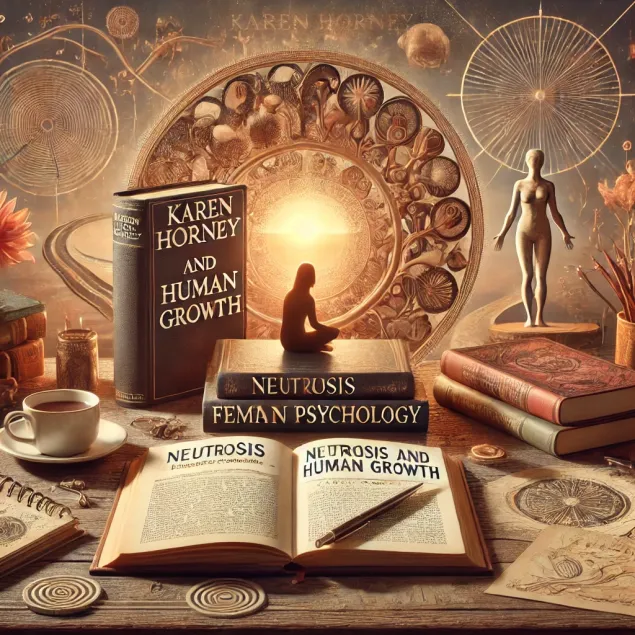532
Book of the Month: Karen Horney

Personal growth won’t really be a movement, even if you’re doing some kind of practice, whether it’s qigong, various meditation or religious practices, or some special diet, until you’ve sorted out your inner world.
Of course, all practices will work anyway, but this is only the tip of the iceberg. On the surface, you may appear calm and cheerful, but if you neglect psychoanalysis, it is unlikely that all this can be called true.
You can invent anything for yourself and push into the unconscious for a very, very long time a variety of neuroses: as drawn from childhood, and appear in the course of life, putting up with them and accepting them as part of your character (which is the biggest trap).
In this article, I would like to talk not just about a single book, but about the author as a whole - about a beautiful book. Karen Horney, Psychologist and Psychoanalyst.
Her work has had a powerful influence on me and deserves, in my opinion, great attention from every city dweller. I want to write about her books for a very long time, and in connection with a long break in broadcasting, I will tell you not about one, but about several at once.Neurosis and Personal Growth and Female Psychology.

Self-analysis A super-powerful practice that is not as simple as it may seem at first glance. It is available to everyone, but at the same time it is available only to mature beings who are able to take responsibility for their own lives without entrusting it to anyone else, be it your parents, your companion or a psychoanalyst.
Of course, the support of loved ones is very important, and in some cases it is impossible to do without the help of an analyst (to someone it is even very shown), but I would like to talk about independent and accomplished people who are ready to continue the movement, believing, first of all, in their own strength..
The ability to listen to ourselves and correctly interpret what we hear is actually in all of us. The difference is how much a person is able to hear what is happening and understand what to do with it. In fact, all practices are aimed at making a person understand himself.
To stop, to think, to see all this incredible gray-burrow-raspberry in a speck of lump and began to work on himself. As a result, it turns out that the most important and difficult practice is a simple stop, analysis and further actions with twisted characteristics of settings.
neurosis
And first it is necessary to understand what is a neurosis and who is a neurotic. Not everyone understands the meaning of these words correctly, and correct understanding is one of the keys to freedom. So what is it all about?
neurosisThis is the inhibition of personality development due to a complex of injuries during life. The neurotic personality has strange fears and phobias due to illogical thinking, is dependent on loved ones, is afraid of the new, is prone to excessive control from the outside and weak emotional-volitional activity. This is the pain and seal of our time: selfish, fast, when people know a lot technically and live in comfort, but have forgotten how to love. The horror is that neurotic personalities among people, if not the majority, then a very large percentage.
Most often, parents did not prepare neurotics for life, but only traumatized them with shouts, scandals, name-calling, ridicule, nitpicking, demands for absolute submission and obedience. Parents themselves turn out to be neurotic personalities: weak, childishly impulsive, unsuccessful. Consciously, they can give the right advice “learn well”, “earn money” and so on, but subconsciously they show an example of unsuccessful and unhappy life. And so neurotic pathology is transmitted to generations and generations.
The neurotic himself resembles an athlete with magnificent inclinations: a leader, a strongman, a kind and deep, an intelligent person. But limbs, capabilities, will and energy potential are atrophied due to parental criticism, coercion, prohibitions and various types of violence: psychological, emotional, physical, and sometimes sexual. In addition to the traumas inflicted by parents and the conditions of growing up, add teachers, friends, relationships, broadcast from popular media and on the output you get the classic neurotic personality of our time.
A Brief List of Neurotic Sclonicities
- Desire to be the best and admire (neurotic pride).
- The desire to be perfect (perfectionism), to always look beautiful, to achieve everything easily and immediately (neurotic attitudes).
- The most severe demands on oneself and others are to do much and perfectly (tyranny “should”).
- Dependence on external assessment (external locus of control).
- The habit of accepting the opinions of others (conformity).
- Ability to fail and get stuck in history (negative subconscious scenarios).
- A tendency to manipulate people.
- Atrophied ability to take active actions to improve their lives.
- A tendency to be helpless.
- Manipulation of emotions to provide a sense of security.
- Difficulty with psychological autonomy, emotional intimacy and spontaneity.
Karen Horney: A Brilliant Mind
Horney shows that each person is a hostage to his own structure of feelings, which is called character.. In fact, the zone of spontaneity, unpredictability, independence of our behavior is limited. A person tends to “preserve” his neurotic structure by resorting to all sorts of pretenses, self-deceptions and illusions.
Deep down, every neurotic is aware of his own weakness. However, for many years he comes to terms with his neurosis, realizes it as part of his own personality, feels the desire to keep habits. He fiercely resists therapeutic work, painfully experiencing the weakening of his character.
One of the main neurotic tendencies Horney countedCompulsive need for love and compulsive desire for power. There may be a neurotic desire for love and a neurotic rivalry in conflict with each other – it is impossible to walk over people’s heads and take care of them (expecting to receive love in return).
In principle, even for a healthy person, competition will mean a deficit in showing love and receiving love in the broad sense of the word. Neurotic tendencies usually have a function (hidden gain). Ultimately, it comes down to removing or mitigating the anxiety of a particular person.
To Horney, The goal of therapy is to restore relationships with people and oneself, to find a point of support in oneself, to get rid of neurotic defense mechanisms that only partially help a person to cope with life difficulties, but with a deeper look close the possibility of normal life.
Books: Knowledge illuminates the way
Karen perfectly helps to understand the causes of conflicts and come to a fuller understanding of themselves and others.. To clear up the rubble of neurotic tendencies, to throw off all fear, excessive tension, demands on oneself and others, to understand what love really is and to become a free, clear and healthy person.
I'll say it again, and I'll say it again. No amount of nutrition, intellectual development or other physical activity can make you truly healthy and free.. No teachers, no religions, just you! Along the way, we meet people and technicians who can greatly help in this understanding, but in the end, all the work is carried out exclusively independently.
I see Karen Horney as the master I met along the way. It helped me deal with a lot of things that I didn’t understand before without taking them seriously. The process of reading her books can not be called exciting and easy: be prepared that you will be hard, hurt and bad, because the awareness of many aspects of your character can lead to a deep shock.
But I can say it's worth it. It is worth reading, understanding and re-reading a little later in order to deepen understanding in accordance with the updated experience.
The first book I recommend is Neurosis and Personal Growth. It is written very affordable and is an excellent assistant on the way for both a young girl and a young man or people of age. I highly recommend her to everyone. I quote from Karen's introduction:
“Finally, the problem of morality is quite different when we believe that the constructive forces of development and evolution are innate in man, and that they are the ones that impel man to realize his potentialities. This does not mean that a person is fundamentally good and good, since the opposite would imply a predetermined knowledge of good and evil.
This means that man, by his nature, voluntarily strives for self-fulfillment, and his value system grows out of this desire. It is clear that he cannot reach his human potential if he does not believe in himself, is not active and productive, if he does not build relationships with people in a spirit of reciprocity, if he gives himself, in Shelley’s words, to “worship the dark idolatry of self” and constantly attributes his shortcomings to the imperfections of others. In the true sense of the word, he can only grow by assigning responsibility for it to himself.
Thus, when the criterion for choosing what to cultivate or eradicate is the question of whether this attitude or attraction of mine hinders or contributes to my human growth, we come to the idea of the morality of evolution. As the frequency of neuroses shows, any kind of compulsion can easily channel constructive energy into unconstructive or even destructive channels. But with faith in the autonomous pursuit of self-fulfillment, we need neither an inner straitjacket for our immediacy nor a whip of inner precepts to drive us to perfection.
Undoubtedly, such disciplinary methods can greatly help in the suppression of undesirable factors; but there is no doubt that they harm our growth. We don’t need them because we see the best way to overcome destructive internal forces, and that is to outgrow them. The way to this goal is through increasing awareness and understanding of oneself. Therefore, self-knowledge in this case is not an end in itself, but serves as a means of releasing the forces of spontaneous growth of personality.
In this sense, work on oneself becomes not only the first moral duty, but at the same time (in a very real sense) the first moral privilege. The transformation we seek depends on our willingness to work on ourselves and is only as serious as we take our growth.
By losing our neurotic obsession with ourselves, we gain the freedom to grow, free to love and care for others. We want to provide them with opportunities for unfettered growth while they are young and to help them find and fulfill themselves in every possible way when they are blocked in their development. The ideal for oneself or for another is the liberation and cultivation of the forces leading to self-fulfillment. "
And the second book I want to focus on for women is Female Psychology.I especially recommend this book to those girls and women who do not feel and unconsciously or consciously deny their feminine nature.
To help better understand the causes of its distortions, to understand negative patterns of behavior, relationships, to see where the roots of the denial of femininity and many other important and interesting aspects of ourselves grow.Karen and her book can. The structure of Horney’s work differs from the previous book, and Female Psychology presents a deeper and more serious analysis of certain tendencies and tendencies. Also for your attention a quote from the introduction:
Horney does not deny that women are often jealous of men and dissatisfied with their female role. Many of her works are devoted to the “complex of masculinity”, which she defines in Forbidden Femininity (1926) as “a complex of feelings and fantasies of a woman, the content of which is determined by the unconscious desire for the advantages that the position of a man gives, envy for men, the desire to be a man and the rejection of the role of a woman.” Initially, she believed that the masculinity complex in a woman was inevitable, as it was necessary to avoid the feelings of guilt and anxiety that were a product of the Oedipus situation.
The masculinity complex is a product of male cultural dominance and the characteristics of the girl’s family dynamics, Horney argued. " In real life, a girl from birth is doomed to be convinced of her inferiority, whether it is spoken rudely or subtly. This situation constantly stimulates her masculinity complex (“Leaving femininity”).
Speaking about family dynamics, Horney initially considered the girl’s relationship with the men of the family to be the most important, but later their mother became the central figure in the case histories of women suffering from masculinity complex. In Mother’s Conflicts (1933), she lists all the features of a girl’s childhood that she considers responsible for the masculinity complex. " Here's what's typical: Girls tended to have very early reasons to dislike their own female world. The reasons for this could be maternal intimidation, a deep disappointment in the relationship associated with the father or brother, an early sexual experience that horrified the girl, the favoritism of the parents towards the brother. All this happened in the childhood of Karen Horney.
In her work on female psychology, Horney gradually moved away from Freud’s belief that “anatomy is destiny” and increasingly singled out cultural factors as the source of women’s problems and problems of gender identification. No, it's not the male's penis that the woman envies, it's the man's privileges. She really needs to have not a penis, but the ability to exercise herself, developing the human abilities inherent in her.
The patriarchal ideal of women does not always meet her inner needs, although the power of this ideal often forces women to behave in accordance with it. In The Problem of Female Masochism, Horney challenges the theory of “the primordial relationship between masochism and the female body.” This belief of some psychoanalysts only reflects the stereotypes of masculine culture, Horney traces a number of social conditions that make women more masochistic than men. Moreover, the comparison of different cultures shows that these conditions are not universal: some cultures are more unfavorable for the development of women.
Although Horney devoted much of her professional life to female psychology, she left the topic in 1935, believing that the role of culture in shaping the woman’s psyche was too great for us to make a clear distinction: this is female and this is not.
In a lecture titled “Women’s Fear of Action” (1935), Horney argues that we can only understand the psychological difference between women and men when women are freed from the concept of femininity imposed by masculine culture. Our aim should not be to define the true essence of femininity, but to encourage the “full and comprehensive development of the individual.” After that, she began to develop her theory, which she believed to be sexually neutral, applicable to both men and women.
Each of us is able to overcome all our difficulties!
The first step in this journey.acknowledgement of their existence. As long as we continue to deny them by saying “it’s all right,” who continues to build up, but an avalanche, you can be sure, will happen inevitably. So the best solution is to get together and start changing. I believe that everyone is capable of it. It's all in your hands!
Success and strength for everyone in this difficult, but super-important for all of us work.
Why is it so long to remember insults and not to say goodbye to offenders?
Drink this beverage every day and You will forget about drugs!























